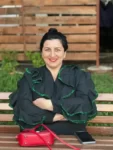Natia, Elene, Maya
My article contains stories of three women of different ages. They themselves wanted others to hear or read their stories.
Sixty-two-year-old Elene, a labor migrant, worked for 22 years in Italy to provide for her family. Upon her return, she found herself a complete alien in her own house with her own family. In the article she talks about this situation of aloofness.
Natia is a Muslim woman living in Adigeni municipality, who shares with us her battles when due to her religion she could not find a job.
“Of course, I don’t stop fighting, hoping that I can be an example for those people who are fighting there,” she stressed.
The third hero of the article, Maya, is a survivor of domestic violence. Her husband physically abused her. She got married when she was underage. It was hard to hear her story, but Maya tried to tell us everything.
She has a message for women: “Don’t get married too early! Leave the abuser as soon as possible, such people never change, do not stay with your husband for any reason. Every woman should believe in herself, so walk away from them! I want to be the last victim of violence!”
My respondents are the women whom I consider heroes. Even talking publicly about the problem makes them heroes.
About the Author

Gulo Kokhodze is a director of Samkhretis Karibche Media House, a renowned media holding in Samtshe-Javakheti, Georgia. In addition to her role as PR manager for a local NGO “Toleranсe”, Gulo works as an editor for the trilingual -Georgian, Russian, Azerbaijani- newspaper “Fesvebi”. Gulo is also a member of the Georgian Council of the Charter of Journalistic Ethics.
Natia, Elene, Maia
Mein Aufsatz berichtet über die Geschichte von drei Frauen unterschiedlichen Alters. Sie hatten den Wunsch, dass ihre Geschichte von anderen verstanden und gelesen wird.
Elene, 62 Jahre alt, ist Arbeitsmigrantin, die 22 Jahre in Italien lebte und ihre Familie ernährte. Zurückgekehrt fühlt sie sich völlig fremd im eigenen Haus und unter ihren Familienangehörigen. Sie spricht im Aufsatz über die fremden Umstände.
Natia Markoidze ist Muslimin, lebt in der Gemeinde Adigeni und erzählt von ihrem Kampf, aus religiösen Gründen keine Arbeit zu finden.
„Ich gebe den Kampf natürlich nicht auf und hoffe darauf, ein gutes Beispiel für andere zu sein“, – dieser Satz ist wichtig aus ihrer Geschichte.
Die dritte Protagonistin, Maia, ist Opfer häuslicher Gewalt. Ihr Ehemann hat sie körperlich belästigt. Sie heiratete als Minderjährige. Es ist schwer, ihre bedrückende Geschichte anzuhören, aber Maia versucht, alles zu sagen.
Sie hat einen Appell an die Frauen: „Heiratet nicht zu früh! Ihr solltet rechtzeitig Euren Gewalttäter verlassen, denn diese Menschen ändern sich nie. Bleibt um keinen Preis bei Eurem Ehemann! Jede Frau sollte an sich glauben, geht weg! Möge ich das letzte Opfer der Gewalt sein!“
Ich denke, die Protagonistinnen meines Artikels sind Heldinnen. Allein, öffentlich über ihre Probleme zu sprechen, ist eine Heldentat.
დაე, მე ვიყო ბოლო და უკანსკნელი ძალადობის მსხვერპლი!
ჩემს სტატიაში მოთხრობილია სხვადასხვა ასაკის სამი ქალის განსხვავებული ისტორია. თავად ჰქონდათ სურვილი მათი ამბავი სხვებს გაეგოთ და წაეკითხათ.
62 წლის ელენე, შრომითი მიგრანტია და 22 წელი იტალიაში მუშაობდა, ოჯახს არჩენდა. უკან დაბრუნებული კი სრულიად უცხო აღმოჩნდა საკუთარ სახლში, საკუთარ ოჯახის წევრებთან. ის სტატიაში გაუცხოებულ გარემოებაზე საუბრობს.
ნათია მარკოიძე მუსლიმია, ადიგენის მუნიციპალიტეტში ცხოვრობს და თავის ბრძოლაზე გვიყვება, რელიგიური ნიშნით თუ როგორ ვერ დასაქმდა.
„ბრძოლას რა თქმა უნდა არ ვწყვეტ მხოლოდ იმ იმედით რომ იქ ვინც არის მებრძოლი ადამიანები მათთვის მაგალითი მაინც ვიყო“, –ეს ფრაზა იყო მნიშვნელოვანი მისი მონათხრობიდან.
სტატიის მესამე გმირი მაია ოჯახური ძალადობის მსხვერპლია, ქმარი მასზე ფიზიკურად ძალადობდა. ის არასრულწლოვანი გათხოვდა. რთული აღმოჩნდა მისი მძიმე ისტორიის მოსმენა, თუმცა მაია ცდილობდა ყველაფერი ეთქვა.
მას ჰქონდა მოწოდება ქალებისადმი –„ადრე არ გათხოვდნენ! დროულად უნდა წამოვიდნენ მოძალადისგან, ასეთი ადამიანები არ იცვლებიან, არ უნდა გაჩერდნენ ქმართან არაფრის გამო. ყველა ქალს საკუთარი თავის იმედი უნდა ჰქონდეს, შემოუძახეთ საკუთარ თავს ქალებო და წამოდით! დაე, მე ვიყო ბოლო და უკანსკნელი ძალადობის მსხვერპლი!“
ჩემი მასალის რესპონდენტი ქალები ვთვლი რომ გმირები არინ. პრობლემაზე საჯაროდ საუბარი მათი მხრიდან უკვე გმირობაა.

გულო კოხოძე სამცხე-ჯავახეთში, საქართველოში, ცნობილ მედიაჰოლდინგის „სამხრეთის კარიბჭის“ მედიაჰაუსის დირექტორად მუშაობს. არასამთავრობო ორგანიზაცია „ტოლერანტში“ პიარ მენეჯერის თანამდებობის გარდა, გულო მუშაობს სამენოვან (ქართულ, რუსულ, აზერბაიჯანულ) გაზეთ „ფესვების“ რედაქტორად. მას ასევე უკავია ადგილი საქართველოს ჟურნალისტური ეთიკის ქარტიის საბჭოში.
Natia, Elene i Maja
Mój artykuł opowiada historie trzech różnych kobiet. Kobiety te chciały, aby ich historia została usłyszana i przeczytana przez innych.
62-letnia Elene, imigrantka zarobkowa, która przez 22 lata pracowała we Włoszech, utrzymywała swoją rodzinę w Gruzji. Gdy powróciła do kraju, poczuła się zupełnie obca we własnym domu. W artykule opowiada o okoliczności swojej rodzinnej alienacji.
Natia Markoidze jest Muzułmanką, mieszka w gminie Adigeni i opowiada o swojej walce oraz jak nie mogła znaleźć pracy ze względów religijnych.
„Oczywiście nie przestaję walczyć tylko w nadziei, że będę przykładem dla tych, którzy walczą”, – to mocne słowa z jej opowieści.
Trzecia bohaterka artykułu, Maja, jest ofiarą przemocy domowej. Jej mąż znęcał się nad nią fizycznie. Wyszła zamąż jako nieletnia. Niełatwo przyszło wysłuchać jej trudnej historii, lecz Maja starała się opowiedzieć wszystko czego doświadczyła.
Jej apel do kobiet – „Nie wychodźcie wcześniej zamąż! Jeśli tylko jest taka potrzeba, od razu musicie opuścić sprawcę, takie osoby się nie zmieniają, nie powinnyście zostawać z mężem tylko po to, żeby z nim być. Każda kobieta powinna uwierzyć w siebie, weźcie się w garść i odejdźcie! Niech ja będę ostatnią i ostateczną ofiarą przemocy!”
Kobiety, które przedstawiam w tekście uważam za bohaterki. Mówienie publiczne o problemie jest już z ich strony bohaterstwem.